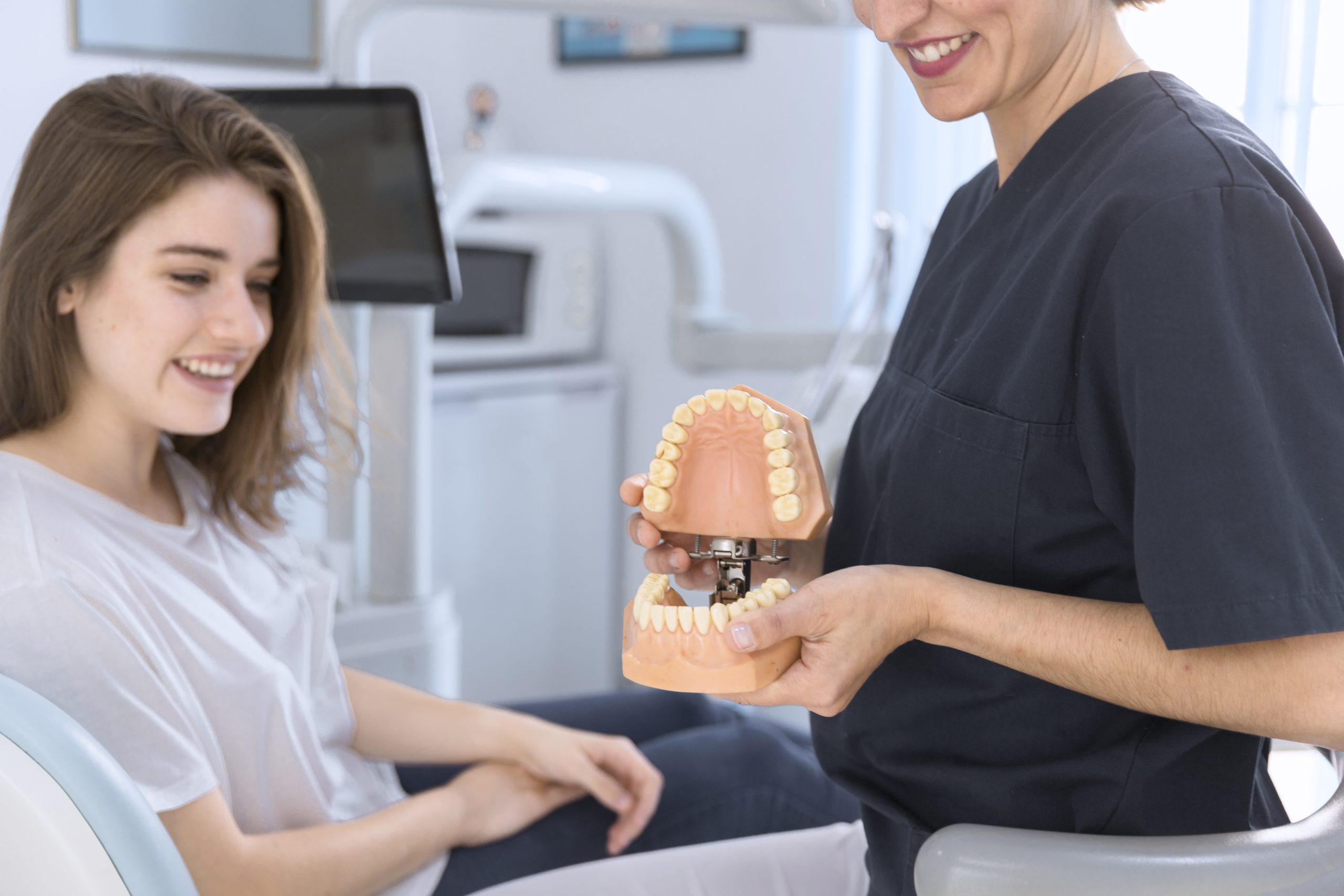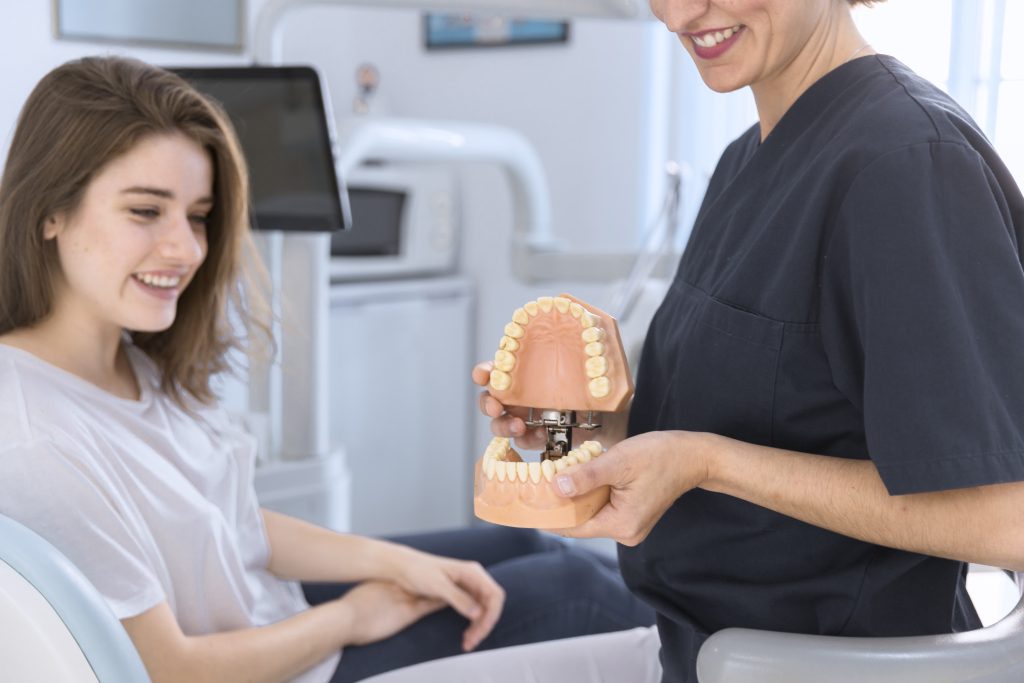When it comes to restoring your smile, dental implants are a game-changer. Whether you’re missing one tooth or several, implants offer a durable and natural-looking solution. At Signature Smiles Pasadena, we specialize in implant dentistry, providing personalized care and state-of-the-art treatments.
In this comprehensive guide, we’ll cover the entire tooth implant process, the benefits of dentures implants, and everything in between.
Table of Contents
- Introduction to Dental Implants
- The Tooth Implant Process
- Benefits of Dentures & Dental Implants
- Preparing for Surgery for Dental Implants
- Permanent Dental Implants: Are They Right for You?
- Finding the Right Dentist for Dental Implants
- Dental Implants Options: What You Need to Know
- Common FAQs about Dental Implants
1. Introduction to Dental Implants
Dental implants are artificial tooth roots, typically made of titanium, that provide a permanent base for fixed or removable replacement teeth. Implants fuse with your jawbone, ensuring they won’t slip or make noise like dentures.
This fusion, known as osseointegration, creates a sturdy foundation for prosthetic teeth, making implants one of the most reliable solutions for tooth replacement.
Implants can support single crowns, bridges, or even full dentures, depending on your needs. They help preserve the jawbone, prevent the shifting of adjacent teeth, and maintain the structure of your face. With proper care, dental implants can last a lifetime, making them a worthwhile investment in your oral health.
Learn more about our dental implant services.
2. The Tooth Implant Process
The procedure for dental implants involves several steps, each crucial for ensuring the implant’s success and your overall satisfaction. Here’s a detailed look at the tooth implant process:
-
Initial Consultation:
- During the initial visit, your dentist will evaluate your dental and medical history and take X-rays or 3D images of your jaw to assess bone density and structure.
- A comprehensive oral examination helps determine if you’re a suitable candidate for implants. Factors such as gum health and any pre-existing conditions will be considered.
-
Tooth Extraction and Implant Placement:
- If a damaged tooth is present, it will be extracted. This is usually done under local anesthesia to minimize discomfort.
- The implant, a small titanium post, is then surgically placed into the jawbone. This post acts as the new root for your tooth.
- In some cases, if the jawbone lacks sufficient density, a bone graft may be necessary before implant placement.
-
Healing Period:
- Over the next few months, the implant will fuse with the jawbone in a process called osseointegration. This period is crucial for the stability of the implant.
- During this time, a temporary crown or denture may be placed to maintain aesthetics and function.
-
Abutment Placement:
- Once osseointegration is complete, a small connector called an abutment is attached to the implant. This piece will hold the final crown in place.
- This minor procedure usually requires local anesthesia and involves reopening the gum to expose the implant.
-
Crown Placement:
- Finally, a custom-made crown, designed to match the color and shape of your natural teeth, is attached to the abutment.
- This crown not only restores function but also blends seamlessly with your smile.
3. Benefits of Dentures & Dental Implants
Dental implants offer numerous advantages over traditional dentures, making them a preferred choice for many patients:
- Durability: Implants are designed to last many years, often a lifetime with proper care. Unlike dentures, which may need frequent adjustments or replacements, implants provide a long-term solution.
- Comfort: Implants function like natural teeth, providing comfort and stability. They eliminate the discomfort and inconvenience associated with removable dentures.
- Improved Oral Health: Unlike bridges, implants don’t require altering adjacent teeth. This preserves your natural tooth structure and promotes better long-term oral health.
- Aesthetics: Implants look and feel like your natural teeth, enhancing your smile and boosting your confidence.
- Bone Preservation: Implants stimulate the jawbone, preventing bone loss and maintaining facial structure.
- Convenience: There’s no need for messy adhesives or special cleaning routines. Implants are maintained with regular brushing and flossing, just like natural teeth.
These benefits make dental implants a superior choice for anyone looking to replace missing teeth and restore their smile.
4. Preparing for Surgery for Dental Implants
Before undergoing surgery for dental implants, proper preparation is essential to ensure a smooth procedure and optimal results. Here’s what you can expect during the preparation phase:
-
Comprehensive Evaluation:
- Your dentist will conduct a thorough evaluation, including dental exams, imaging (X-rays or 3D scans), and a review of your medical history.
- This assessment helps determine your suitability for implants and identifies any potential issues that need to be addressed beforehand.
-
Treatment Planning:
- A detailed treatment plan will be created, outlining the entire process from start to finish. This plan will include the number of implants needed, the type of restorations, and the timeline for each stage.
- Your dentist will discuss anesthesia options to keep you comfortable during the procedure. Local anesthesia is commonly used, but sedation or general anesthesia may be considered for complex cases or anxious patients.
-
Pre-Surgery Instructions:
- You’ll receive specific instructions on how to prepare for surgery, such as fasting requirements if sedation or general anesthesia will be used.
- Your dentist may prescribe antibiotics to take before the surgery to prevent infection.
-
Bone Grafting (if necessary):
- If your jawbone lacks sufficient density or volume, a bone graft may be required. This procedure involves adding bone or bone-like materials to strengthen the jawbone and provide a stable foundation for the implant.
-
Health Considerations:
- It’s crucial to discuss any existing medical conditions, medications, or allergies with your dentist. Certain health issues, such as uncontrolled diabetes or heart disease, may affect your eligibility for implants.
5. Permanent Dental Implants: Are They Right for You?
Permanent dental implants might be right for you if you have one or more missing teeth, sufficient jawbone density, and are in good overall health. They offer a stable and long-lasting solution compared to other tooth replacement options.
Check out our services for permanent dental implants.
6. Finding the Right Dentist for Dental Implants
Choosing a dentist that does implants is crucial for a successful outcome. Look for experienced professionals with positive patient reviews and advanced training in implant dentistry.
- Experience: Ensure your dentist has ample experience in implant procedures.
- Technology: Modern dental technology can significantly enhance treatment outcomes.
- Comfort: A compassionate and communicative dentist can make the process smoother.
7. Dental Implants Options: What You Need to Know
There are several types of dental implants to consider:
- Endosteal Implants: The most common type, placed directly into the jawbone.
- Subperiosteal Implants: Placed under the gum but above the jawbone, suitable for patients with minimal bone height.
- All-on-4 Implants: A solution for replacing an entire arch of teeth using four implants.
Common FAQs about Dental Implants
With proper care, dental implants can last a lifetime.
Regular brushing, flossing, and dental check-ups are essential to maintain your implants.
Most people with healthy gums and sufficient bone can get implants. However, certain conditions like uncontrolled diabetes or heart disease may affect eligibility.
The cost varies depending on the number of implants, the complexity of the procedure, and geographic location. Consult with your dentist for an accurate estimate.
Dental implants are a revolutionary solution for missing teeth, offering durability, comfort, and improved oral health. Whether you’re considering dentures implants or permanent dental implants, understanding the tooth implant process and preparing adequately can ensure a successful outcome.
At Signature Smiles Pasadena, we’re dedicated to providing top-notch implant dentistry services.
For more information, feel free to visit our service page and explore our other dental services.






